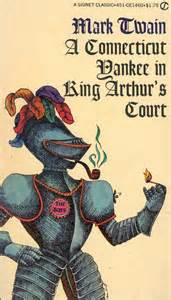“The repulsive feature of slavery is the thing, not its name. One needs but to hear an aristocrat speak of the classes that are below him to recognize—and in but indifferently modified measure—the very air and tone of the actual slaveholder; and behind these are the slaveholder’s spirit, the slaveholder’s blunted feeling. They are the result of the same cause, in both cases: the possessor’s old and inbred custom of regarding himself as a superior being.” (385–386)
In this quote, Mark Twain is giving a transhistorical definition of slavery. Fair enough, I suspect. He does the same with technology, which emerges as either a tool of oppression or a means of liberation. Modern or medieval they have those same potentialities.
To begin, I want to say that Mark Twain gives technology a great deal of autonomy in A Connecticut Yankee in King Arthur’s Court. While we know he was caught up in the excitement for technology of his age. This enthusiasm led to his bankruptcy around the time that this novel was published over his investments into the Paige typesetters. I am not sure if we should read A Connecticut Yankee as Twain’s suggestion that context does not matter in the application of technologies, but that certainly seems to be the implication of the novel. The introduction of nineteenth century technologies to the sixth century promotes political and social reforms. While it is a great novel and very entertaining, it is not at all convincing that a sole time traveler could introduce the infrastructure of industrialization to the sixth century. Even in that episode of Star Trek where Data goes back in time (bumping into Mark Twain as a matter of fact) he only builds devices, not an entire infrastructure.
The novel works as a polemic against slavery and arbitrary hierarchy. Where does technology fit into this picture? Most clear is how technology was the key to the rise of “The Boss” in Camelot. A time traveler, he was able to introduce first small technologies in order to become the greatest wizard in England. First secretly and then openly he rolled out a technocratic republic to replace the medieval monarchy of Arthur. This included public schooling, newspapers, industries, and modern weapons. “The Boss” uses technology to battle the evils of chivalry and over turn their dominance over the enslaved peasants. He is at times a “boss” trying to benefit himself and solidify his leadership of Camelot, but he is also a Robespierre always eager for a political revolution and willing to use technological reforms to affect it.
After touring the countryside, “The Boss” and King Arthur are placed into slavery. After their escape, “The Boss” emerges eager to take on the cult of chivalry. He does this in a tournament, where he comes armed with a lasso and a revolver. After killing a dozen or so knights, he proves to all observers the triumph of his technology (really wizardry to the observers), but not yet his values. The revolution “The Boss” is after required violence.
There is a bit of hypocrisy in “The Boss” over democracy. First, he is very much interested in securing his own power. For all his talk of destroying aristocracy, he did not seem to trust peasants with their freedom (they would need to be civilized first). In this he may reflect the values of nineteenth-century Western imperialism. When describing his battle in the tournament he thoughts: “It was born of the fact that all the nation knew that this was not a duel between two mighty magicians; a duel not of muscle or the mind, not of human skill but of super human art and craft, a final struggle for supremacy between the two master enchanters of the age.” (494) In this, he simply shifted the terms of the debate to what was most advantageous to an industrial-era machinist. Not quite a democracy, more of a technocratic meritocracy is in his mind. Like in many meritocracies and technocracies, the terms of merit are defined by those already in power.
If “The Boss” is able to put nineteenth century technologies into medieval England while leapfrogging centuries of economic and political developments, it is not clear that democracy could be placed in Camelot without first some elements of the reforms of “The Boss.” He mentions that democracy is the only way to remove barbarism from the legal and political system. And as far as “The Boss” is concerned, elevating democracy requires brining along all of the nineteenth century along with him. Of course, that is what puts him in a bind at the end of the story when he is holed up with his technology with the corpses of 30,000 knights trapping him in.
The climax to the story comes with the Church’s interdict over “The Boss” and his endeavors. This act is inspired as much by his political reforms, as his technological introductions. He promised to transform Camelot into a republic by replacing the king, when he dies, with an elected leader. The interdict leads to his fall, another suggestion that no matter how easily the technology is able to be placed in a new environment, the political and social transformation “The Boss” sought was an impossibility. For Mark Twain, social changes comes much more slowly and much more violently than technological revolutions. The challenge is not to transcend time, but to ensure that our moral and social values are reflected in the technologies we use.
